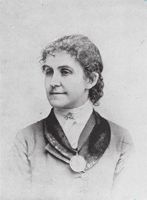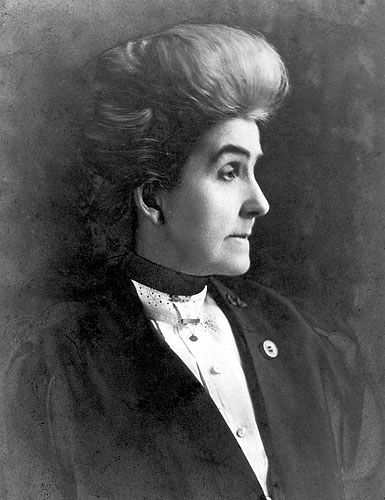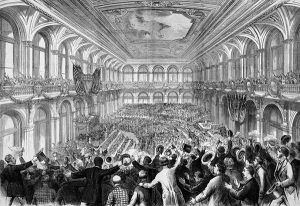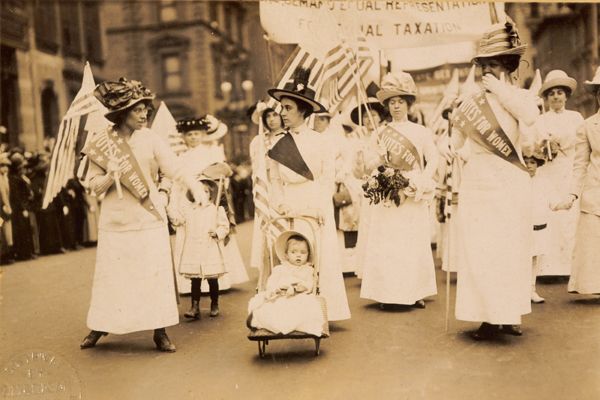One of the first female lawyers in the United States, the first female appointed as a U.S. Marshal, and a well-known suffragist, Phoebe Couzins was a trailblazer for women’s rights and equality.
Phoebe was born to Adaline and John E.D. Couzins on September 8, 1842, in St. Louis, Missouri. Her father was an architect and builder, and her mother was active in charity work. At an early age, Phoebe learned the value and importance of public service from her parents. In 1849, when she was just six years old, a terrible cholera epidemic swept through St. Louis. Thousands of the city’s residents died. John and Adaline Couzins led the local relief organization responsible for helping cholera victims.
During the Civil War, her father served as the St. Louis Chief of Police and as a member of the Committee of Public Safety, a group that sought to keep Missouri in the Union. Her mother volunteered as a nurse during the war and was a Ladies Union Aid Society member. After the war, Adaline and Phoebe joined the St. Louis Woman Suffrage Association, an organization that promoted the right of women to vote and to hold political office.
In 1869, Phoebe began her studies at Washington University in St. Louis law school, one of the first schools in the country to offer a woman education in jurisprudence. The same year, Couzins served as a delegate to the American Equal Rights Association convention in St. Louis, where she met influential suffragists Susan B. Anthony and Elizabeth Cady Stanton. Unsatisfied with existing women’s Spirituality organizations, Stanton and Anthony formed the National Woman Suffrage Association, which Couzins joined. Phoebe also began to write articles for Stanton and Anthony’s publication, “The Revolution” and began traveling across the country giving speeches in favor of women’s rights. She was described as a riveting orator.
In 1871, Phoebe graduated from law school as the first female law graduate of Washington University and the second woman in the nation to graduate from law school. At her graduation celebration, she explained her motivation for earning a law degree, claiming to be spurred “solely by a desire to open new paths for women.” In the course of her career, she would be admitted to the bar associations of Missouri, Arkansas, Utah, and Kansas, and the Dakota Territory federal courts.
On the opening day of the 1876 Democratic National Convention in St. Louis, Phoebe Couzins delivered an address to male convention delegates on behalf of the National Woman Suffrage Association. Couzins implored the Democratic Party’s delegates to support women’s suffrage and include it as part of the party’s political platform but to no avail. Although unable to vote and barred from participating in the political process, women did attend the convention, watching the proceedings from their seats in the balconies.
In 1884, she testified before the U.S. House Judiciary Committee on the legal status of women. The same year, her father was appointed as the U.S. Marshal for the Eastern District of Missouri and soon made his daughter one of his deputies. After her father died in 1887, Couzins was appointed interim U.S. marshal by President Grover Cleveland, making her the first woman to serve in that position. Two months later, she was replaced by John W. Emerson.
During this time, both Phoebe and her mother, Adaline were still members of the St. Louis Woman Suffrage Association and the Ladies’ Union Aid Society.
Couzins then moved to Washington, DC, where she made a modest living as a writer.
In 1890 the National Woman Suffrage Association (NWSA) and the American Woman Suffrage Association (AWSA) merged, and Phoebe was outspoken in her support of the NWSA leadership. This antagonized women in both organizations, locally and nationally.
She also ruffled feathers as a Missouri representative on the Board of Lady Managers for the 1893 World’s Columbia Exposition in Chicago. She had a job as board secretary but attempted to dominate the meetings and was fired. She sued for reinstatement but lost.
As she grew older, Couzins’s ambitious, outspoken personality alienated friends in the women’s suffrage movement at a time when she could ill afford to do so. Battling poor health and being disillusioned with younger, wealthier members of the suffragist movement, she denounced the cause and became a national lecturer and lobbyist for the United Brewers Association and actively protested prohibition.
As a lobbyist, Couzins spoke out against the temperance movement, which sought to prohibit the sale and consumption of alcohol. Her actions upset acquaintances in the women’s movement as temperance was a favorite cause of many suffragists. In 1902 Couzins experienced a change of heart and again supported the suffrage movement.

Phoebe Couzins, first professional woman lawyer in the United States. Missouri State Historical Society
Couzins lost her job as a lobbyist in 1908. At the age of 68, she found herself penniless, in failing health, and unable to work. She returned to St. Louis and appealed to the federal government for a job and the Brewers Association for aid. She also solicited friends for help.
She died in St. Louis on December 6, 1913. She was buried wearing her U.S. marshal’s badge in Bellefontaine Cemetery. She was mourned by only her brother and a few friends. Her funeral was attended by only six people. Her grave remained unmarked until 1950, when members of the Women’s Bar Association of St. Louis placed a headstone on her final resting place in memory of her accomplishments.
© Kathy Alexander/Legends of America, updated November 2022.
Also See:
Lady Marshals of Indian Territory
Women’s Suffrage in the United States
Sources:
State Historical Society of Missouri
Wikipedia
Women’s Council



